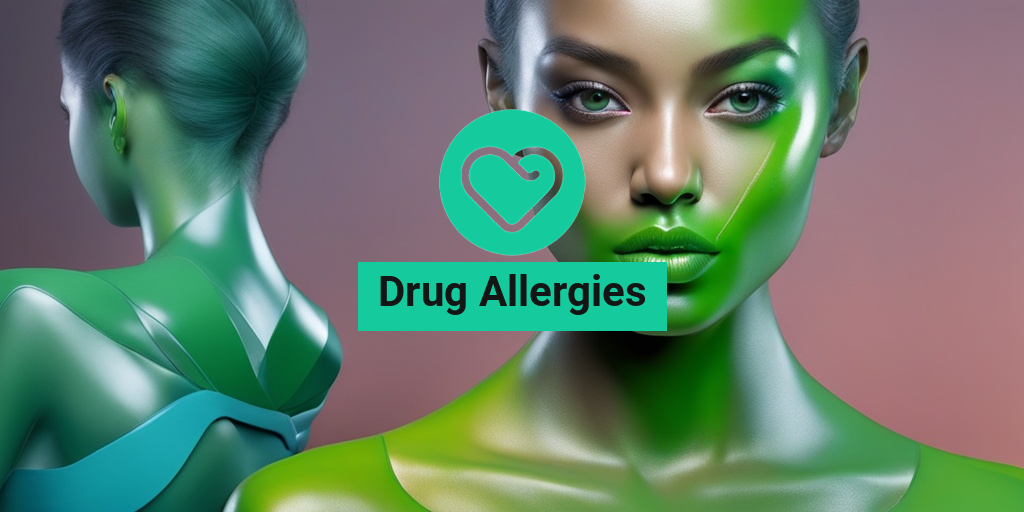What Are Drug Allergies?
Have you ever taken a medication only to experience an unexpected and unpleasant reaction? You’re not alone! Drug allergies are a common phenomenon that can affect anyone, regardless of age or health status. But what exactly are drug allergies, and how do they differ from adverse drug reactions?
Defining Drug Allergies
A drug allergy is an overreaction of the immune system to a specific medication. When you take a drug, your immune system mistakenly identifies it as a harmful substance and launches an attack, releasing chemicals that cause an allergic reaction. This reaction can range from mild to severe and even life-threatening in some cases.
It’s essential to note that drug allergies are different from adverse drug reactions, which are unintended effects of a medication. Adverse reactions can be caused by various factors, such as overdose, interactions with other medications, or individual tolerance. In contrast, drug allergies are a specific immune response to a particular drug.
Risk Factors for Drug Allergies
While anyone can develop a drug allergy, certain individuals are more prone to experiencing an allergic reaction. These include:
- People with a history of allergies or asthma
- Those who have a family history of drug allergies
- Individuals with a weakened immune system, such as those with HIV/AIDS or undergoing chemotherapy
- Pregnant or breastfeeding women
- Older adults, as their immune system may be less efficient
If you’re concerned about drug allergies, it’s crucial to discuss your medical history and any allergies with your healthcare provider before taking a new medication. They can help you identify potential risks and recommend alternative treatments.
Common Drug Allergy Symptoms
Drug allergy symptoms can vary in severity and may appear within minutes or hours after taking a medication. In some cases, symptoms may not manifest until days or even weeks later. Here are some common signs of a drug allergy:
Mild to Moderate Symptoms
- Hives or itchy skin
- Rash or redness
- Fever
- Swollen face, lips, tongue, or throat
- Nausea or vomiting
- Diarrhea or stomach cramps
- Fatigue or weakness
Severe Symptoms
- Anaphylaxis, a life-threatening allergic reaction that requires immediate medical attention
- Difficulty breathing or swallowing
- Rapid heartbeat or palpitations
- Fainting or dizziness
- Severe abdominal pain or cramping
If you experience any of these symptoms after taking a medication, seek medical attention right away. In the case of anaphylaxis, call emergency services or administer epinephrine using an EpiPen if available.
Remember, it’s always better to err on the side of caution when it comes to drug allergies. If you’re unsure about a medication or have concerns about an allergic reaction, consult with your healthcare provider or a trusted resource like Yesil Health AI (yesilhealth.com) for evidence-based health answers. 🏥💊

Types of Drug Allergies
Drug allergies can manifest in various ways, and understanding the different types is crucial for effective diagnosis and treatment. While some drug allergies may cause mild reactions, others can be life-threatening. Let’s explore the common types of drug allergies:
1. Immediate Hypersensitivity Reactions
These reactions occur within minutes to hours after taking a medication. Symptoms may include:
- Hives or itchy skin
- Swelling of the face, lips, tongue, or throat
- Difficulty breathing
- Abdominal cramps
- Diarrhea
- Fainting or dizziness
Immediate hypersensitivity reactions are often caused by medications like penicillin, sulfa drugs, and insulin.
2. Delayed Hypersensitivity Reactions
These reactions occur days or weeks after taking a medication. Symptoms may include:
- Rash or skin lesions
- Fever
- Joint pain or swelling
- Swollen lymph nodes
Delayed hypersensitivity reactions are often caused by medications like antibiotics, anticonvulsants, and nonsteroidal anti-inflammatory drugs (NSAIDs).
3. Idiosyncratic Reactions
These reactions are unpredictable and can occur at any time, even after taking a medication for a long period. Symptoms may include:
- Liver damage
- Kidney damage
- Blood disorders
- Seizures
Idiosyncratic reactions are often caused by medications like antidepressants, antipsychotics, and certain antibiotics.
Causes of Drug Allergies
Drug allergies occur when the body’s immune system mistakenly identifies a medication as a harmful substance. This can happen due to various factors, including:
Genetic Predisposition
Some people may be more prone to developing drug allergies due to their genetic makeup. Research suggests that certain genetic variations can increase the risk of drug allergies.
Previous Exposure
If you’ve taken a medication before and had an allergic reaction, you’re more likely to experience an allergic reaction again in the future.
Multiple Medications
Taking multiple medications simultaneously can increase the risk of drug allergies. This is because the body may have difficulty processing multiple substances, leading to an immune response.
Underlying Medical Conditions
Certain medical conditions, such as atopic dermatitis, asthma, or rheumatoid arthritis, can increase the risk of drug allergies.
Understanding the causes and types of drug allergies is crucial for effective diagnosis and treatment. If you suspect you have a drug allergy, consult your healthcare provider for proper evaluation and guidance. 🏥

Risk Factors for Drug Allergies
Drug allergies can affect anyone, but some individuals are more prone to experiencing an adverse reaction to certain medications. Understanding the risk factors can help you take necessary precautions and consult with your healthcare provider if you’re at risk.
Genetic Predisposition
Research suggests that drug allergies can be hereditary. If you have a family history of drug allergies, you may be more likely to experience an allergic reaction. This is because your genetic makeup can affect how your body processes certain medications.
Previous Allergic Reactions
If you’ve had an allergic reaction to a particular drug or medication in the past, you’re more likely to experience another reaction in the future. This is because your immune system has already identified the drug as a potential threat, making it more likely to react adversely.
Age
Older adults are more susceptible to drug allergies due to age-related changes in their immune system and metabolism. As we age, our bodies become less efficient at processing medications, increasing the risk of an allergic reaction.
Underlying Medical Conditions
Certain medical conditions, such as asthma, eczema, or rheumatoid arthritis, can increase your risk of developing a drug allergy. This is because these conditions can affect your immune system, making it more reactive to certain medications.
Multiple Medications
Taking multiple medications simultaneously can increase your risk of experiencing a drug allergy. This is because the interactions between different drugs can trigger an allergic reaction.
Diagnosing a Drug Allergy
Diagnosing a drug allergy can be a complex process, as the symptoms can be similar to those of other conditions. However, an accurate diagnosis is crucial to prevent future allergic reactions and ensure proper treatment.
Medical History
Your healthcare provider will start by taking a detailed medical history, including any previous allergic reactions, medications you’re currently taking, and any underlying medical conditions.
Physical Examination
A thorough physical examination will help your healthcare provider identify any signs of an allergic reaction, such as rash, hives, or swelling.
Allergy Testing
In some cases, allergy testing may be necessary to confirm a drug allergy. This can include:
- Skin testing: A small amount of the suspected drug is applied to your skin to observe any reaction.
- Blood tests: A blood sample is taken to measure the levels of allergy-related antibodies.
- Challenge testing: A small dose of the suspected drug is administered under close medical supervision to observe any reaction.
By understanding the risk factors and diagnostic process, you can take proactive steps to minimize your risk of experiencing a drug allergy. Remember to always consult with your healthcare provider if you have any concerns or questions about your medications. 💊

Treatment for Drug Allergies
When it comes to treating drug allergies, the primary goal is to alleviate symptoms and prevent future reactions. The approach to treatment varies depending on the severity of the reaction and the specific drug involved. Here are some common treatment options:
Antihistamines and Corticosteroids
In mild to moderate cases, antihistamines and corticosteroids may be prescribed to reduce symptoms such as itching, hives, and swelling. These medications can help alleviate discomfort and inflammation, but they may not be effective in severe reactions.
Epinephrine Injections
In severe cases, epinephrine injections may be necessary to treat anaphylaxis, a life-threatening allergic reaction. Epinephrine injections, such as EpiPen, can help restore breathing, lower blood pressure, and reduce swelling.
Topical Creams and Ointments
For skin reactions, topical creams and ointments may be prescribed to reduce inflammation and itching. These creams can be applied directly to the affected area to provide quick relief.
Desensitization Therapy
In some cases, desensitization therapy may be recommended to help the body gradually become tolerant to the drug. This process involves gradually increasing the dose of the drug under close medical supervision.
Managing a Drug Allergy Reaction
If you suspect you’re experiencing a drug allergy reaction, it’s essential to act quickly and seek medical attention. Here are some steps to take:
Stop Taking the Drug
The first step is to stop taking the drug immediately. This can help prevent the reaction from worsening and reduce the risk of further complications.
Seek Medical Attention
Seek medical attention right away if you experience any symptoms of a drug allergy reaction, such as hives, itching, swelling, or difficulty breathing. Call emergency services or visit the emergency room if you experience severe symptoms.
Identify the Culprit
Try to identify the drug that triggered the reaction. This information can help your healthcare provider determine the best course of treatment and prevent future reactions.
Monitor Your Symptoms
Keep a close eye on your symptoms and report any changes to your healthcare provider. This can help them adjust your treatment plan and ensure you receive the best possible care.
Remember, drug allergies can be unpredictable and potentially life-threatening. If you’re unsure about your symptoms or the severity of your reaction, always err on the side of caution and seek medical attention. 🚑
By understanding the treatment options and taking the right steps to manage a drug allergy reaction, you can reduce the risk of complications and ensure your safety. 💊

Frequently Asked Questions about Drug Allergies
What are Drug Allergies?
A drug allergy is an adverse reaction to a medication that occurs when your immune system mistakenly identifies the drug as harmful. This can cause a range of symptoms, from mild discomfort to life-threatening reactions.
What are the Common Symptoms of Drug Allergies?
The symptoms of drug allergies can vary depending on the individual and the medication. However, common symptoms include:
- Hives or itchy skin
- Rash or redness
- Swollen face, lips, tongue, or throat
- Difficulty breathing or swallowing
- Fever or chills
- Nausea or vomiting
How are Drug Allergies Diagnosed?
Diagnosing drug allergies typically involves a combination of:
- Medical history: Your doctor will ask about your symptoms, medical history, and any medications you’re taking.
- Physical exam: Your doctor will perform a physical exam to look for signs of an allergic reaction.
- Tests: Your doctor may order tests, such as skin tests or blood tests, to confirm the presence of an allergy.
Can Drug Allergies be Inherited?
While drug allergies are not directly inherited, some people may be more prone to developing allergies due to their genetic makeup. If you have a family history of allergies, you may be more likely to develop a drug allergy.
How are Drug Allergies Treated?
Treatment for drug allergies typically involves:
- Stopping the medication: If you’re experiencing an allergic reaction, your doctor will likely advise you to stop taking the medication.
- Antihistamines or corticosteroids: Your doctor may prescribe medications to relieve symptoms such as itching, hives, or swelling.
- Emergency treatment: In severe cases, emergency treatment may be necessary to prevent anaphylaxis, a life-threatening allergic reaction.
Can I Take Medications if I Have a Drug Allergy?
If you have a drug allergy, it’s essential to inform your doctor or pharmacist before taking any new medications. They can help you:
- Choose alternative medications: Your doctor may prescribe alternative medications that are less likely to cause an allergic reaction.
- Take precautions: Your doctor may recommend taking precautions, such as starting with a low dose or monitoring your symptoms closely.
What Should I Do if I Experience a Drug Allergy?
If you experience symptoms of a drug allergy, seek medical attention immediately 🚨. Call emergency services or visit the emergency room if you experience:
- Difficulty breathing
- Swollen face, lips, tongue, or throat
- Severe hives or rash
- Fever or chills
Remember, it’s always better to err on the side of caution when it comes to drug allergies. If you’re unsure about your symptoms or have concerns, consult with your doctor or pharmacist. 💊




